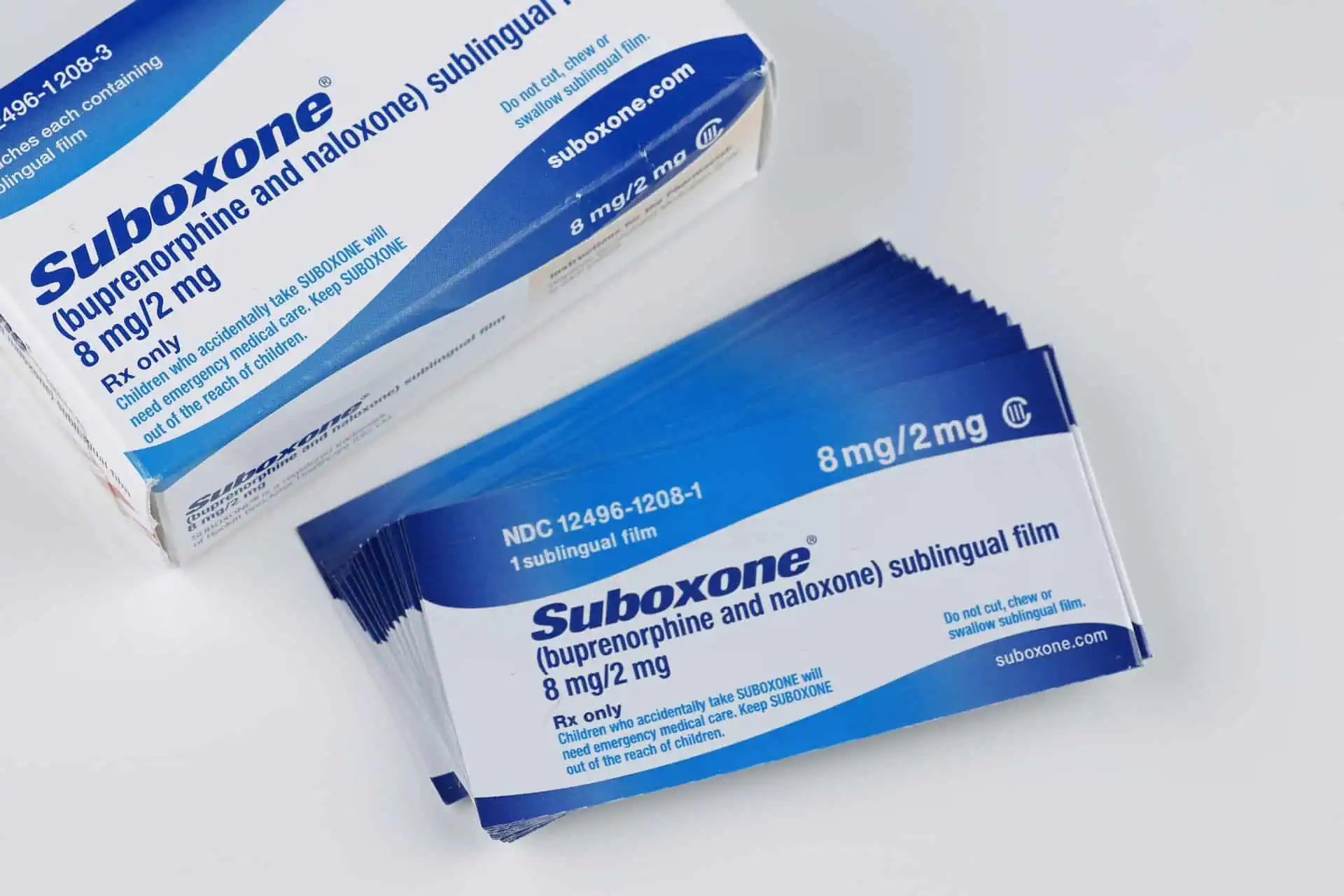Suboxone Mouth Sores: Causes, Symptoms, and Treatment
- Last Updated: June 12th, 2025

Attorney Jessica Paluch-Hoerman, founder of TruLaw, has over 28 years of experience as a personal injury and mass tort attorney, and previously worked as an international tax attorney at Deloitte. Jessie collaborates with attorneys nationwide — enabling her to share reliable, up-to-date legal information with our readers.
Legally Reviewed
This article has been written and reviewed for legal accuracy and clarity by the team of writers and legal experts at TruLaw and is as accurate as possible. This content should not be taken as legal advice from an attorney. If you would like to learn more about our owner and experienced injury lawyer, Jessie Paluch, you can do so here.
Fact-Checked
TruLaw does everything possible to make sure the information in this article is up to date and accurate. If you need specific legal advice about your case, contact us by using the chat on the bottom of this page. This article should not be taken as advice from an attorney.
Key takeaways:
- Suboxone mouth sores are a prevalent side effect among users, with factors such as the medication's administration method and individual susceptibility influencing their occurrence.
- Diagnosing Suboxone mouth sores involves a comprehensive dental examination and additional tests to assess the presence and extent of oral damage, and consulting with a healthcare professional is crucial if unusual symptoms arise.
- Treatment options for Suboxone mouth sores include medications to fortify the oral environment, dental interventions to mitigate adverse effects, and lifestyle modifications to reduce the risk of developing sores while continuing addiction treatment.
Overview of Suboxone Mouth Sores
On this page, we’ll discuss Suboxone mouth sores, potential causes of mouth sores related to Suboxone use, how to manage and treat Suboxone mouth sores, and much more.
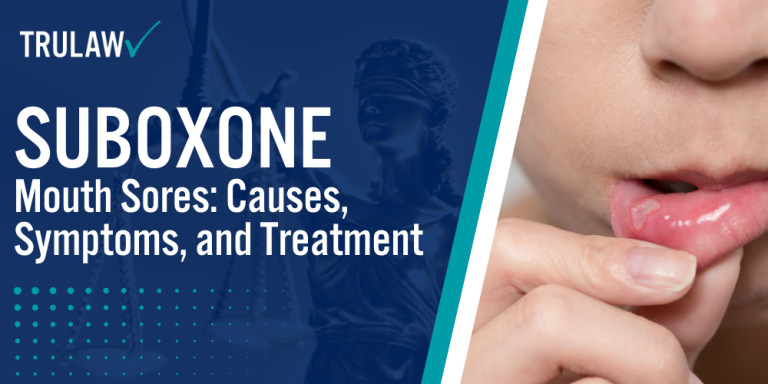
Intro to Suboxone Mouth Sores
Some key points about Suboxone mouth sores include, but are not limited to:
- Causes: Suboxone films can alter the oral environment, leading to changes in pH levels and bacterial balance and contributing to the development of mouth sores.
- Types of Sores: Suboxone use may lead to various mouth sores, including canker sores, cold sores, or oral thrush.
- Symptoms: Suboxone mouth sores can cause pain, burning sensation, redness, and difficulty eating or drinking.
- Treatment: Managing Suboxone mouth sores may involve a combination of oral hygiene measures, topical treatments, and in some cases, adjustments to Suboxone therapy.
If you have developed mouth sores after using Suboxone sublingual films, it’s essential to explore your legal options.
Contact TruLaw today using the chat on this page for a free case evaluation to discuss your Suboxone-related mouth sores and potential legal recourse.
Table of Contents
Prevalence of Mouth Sores Among Suboxone Users
Reports indicate that some users of Suboxone can experience mouth sores, a condition where a sore mouth burning sensation or lesions develop on the oral mucosa.
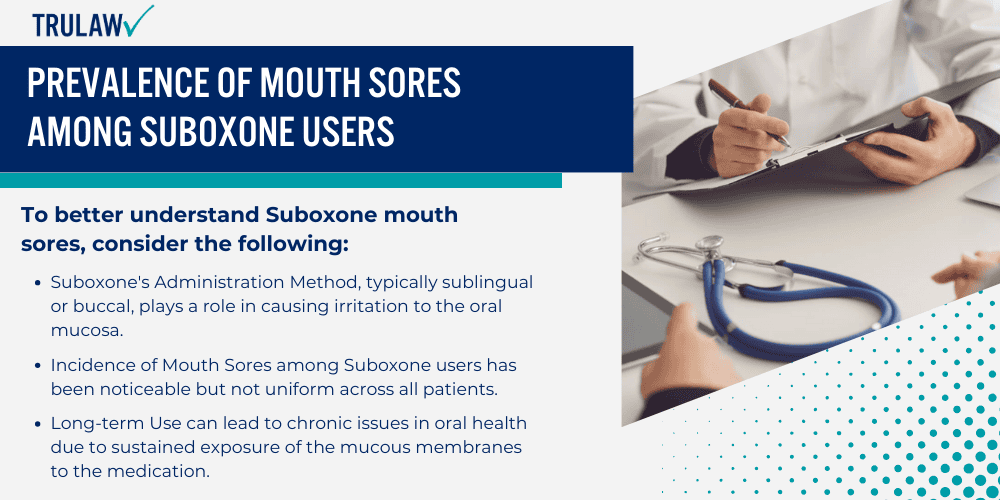
The prevalence of these sores can vary based on several factors, such as the method of medication use and individual susceptibility.
The incidence of these sores is not fully understood.
To better understand Suboxone mouth sores, consider the following:
- Suboxone’s Administration Method, typically sublingual or buccal, plays a role in causing irritation to the oral mucosa.
- Incidence of Mouth Sores among Suboxone users has been noticeable but not uniform across all patients.
- Long-term Use can lead to chronic issues in oral health due to sustained exposure of the mucous membranes to the medication.
- Patients should be aware of the symptoms, such as sore mouth burning, which may manifest with varying degrees of severity.
Causes of Suboxone-Related Mouth Sores
Suboxone, a medication containing sublingual buprenorphine and buprenorphine naloxone, is linked to the development of mouth sores.
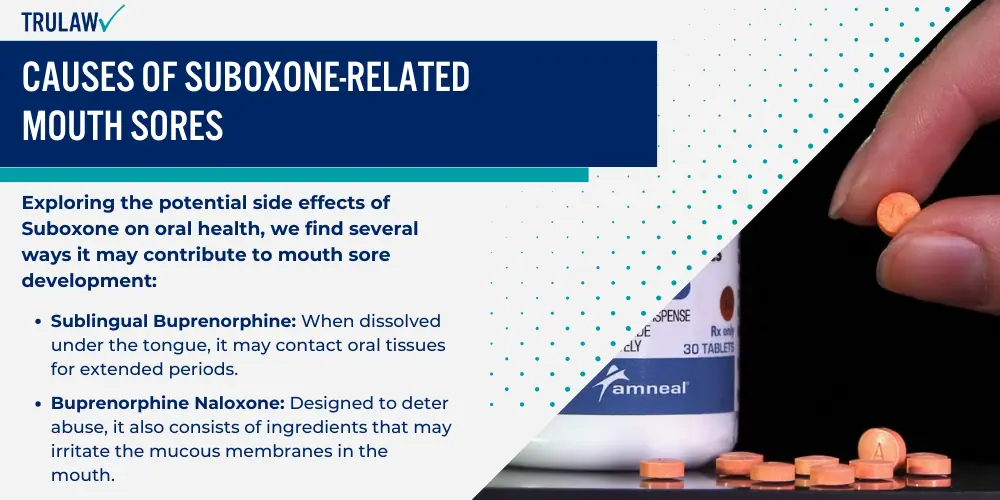
Its form and the way it’s administered are essential to understand why some patients may experience this side effect.
An underlying sublingual space infection may also contribute to the development of these sores.
Suboxone Formulations and Mouth Sore Development
Suboxone is formulated for sublingual administration, which means the medication is placed under the tongue to dissolve.
This method of delivery, while effective for the treatment of opioid dependence, has been associated with oral health issues.
Exploring the potential side effects of Suboxone on oral health, we find several ways it may contribute to mouth sore development:
- Sublingual Buprenorphine: When dissolved under the tongue, it may contact oral tissues for extended periods.
- Buprenorphine Naloxone: Designed to deter abuse, it also consists of ingredients that may irritate the mucous membranes in the mouth.
- Instances of Contact Hypersensitivity Stomatitis: an inflammation of the mouth, have been observed with sublingual applications.
- Underlying Sublingual Space Infections: may exacerbate the condition, leading to further complications and discomfort.
Other Factors Contributing to Suboxone Mouth Sores
Suboxone is known to be an effective treatment for opioid dependency, but it comes with its own set of challenges, including the possibility of mouth sores.
These painful ulcers can be a source of discomfort for patients, making it important to understand all potential contributing factors.
While the formulation plays a significant role, other factors could also contribute to the development of mouth sores in patients taking Suboxone:
- The continual presence of the medication in the mouth could disrupt the natural oral flora, leading to a higher risk of sores.
- Some patients may experience allergic contact stomatitis, an allergic reaction manifested as mouth sores, due to a hypersensitivity to ingredients in the medication.
- Poor oral hygiene could compound the problem by allowing bacteria to thrive in the irritated regions.
- Other oral health issues, if already present, can be aggravated by the continuous exposure to Suboxone, making mouth sores more likely to occur. Oral disease may also contribute to the development of these sores.
Symptoms of Suboxone Mouth Sores
Suboxone mouth sores can be a discomforting side effect for individuals undergoing treatment for opioid dependency.
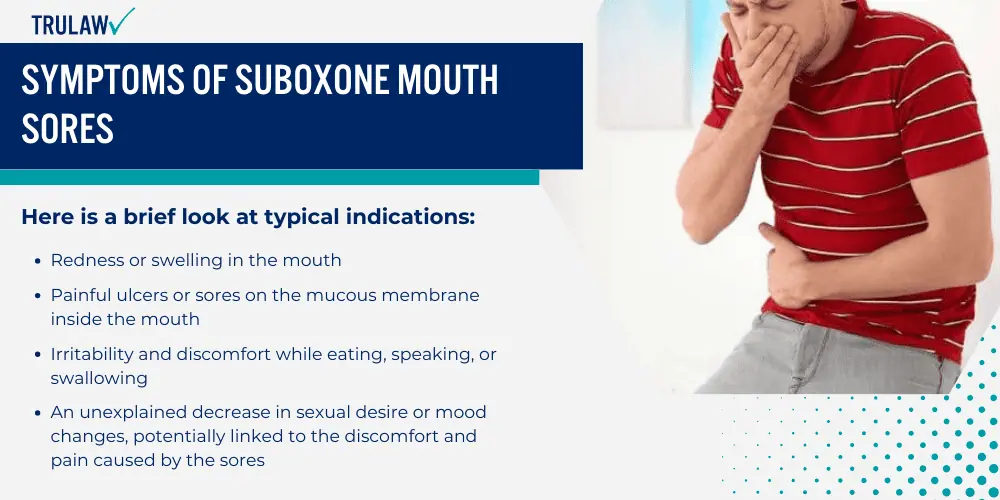
These sores are specifically linked to the medication and should not be confused with other oral conditions.
Patients may also experience pain, diarrhea, or a runny nose following symptoms above.
Common Signs and Symptoms of Suboxone Mouth Sores
Suboxone mouth sores manifest through a variety of symptoms that can affect patients’ oral health and comfort.
Here is a brief look at typical indications:
- Redness or swelling in the mouth
- Painful ulcers or sores on the mucous membrane inside the mouth
- Irritability and discomfort while eating, speaking, or swallowing
- An unexplained decrease in sexual desire or mood changes, potentially linked to the discomfort and pain caused by the sores
Differentiating Suboxone Mouth Sores from Other Oral Issues
Patients may sometimes misattribute symptoms to Suboxone when they could signal other oral diseases or conditions.
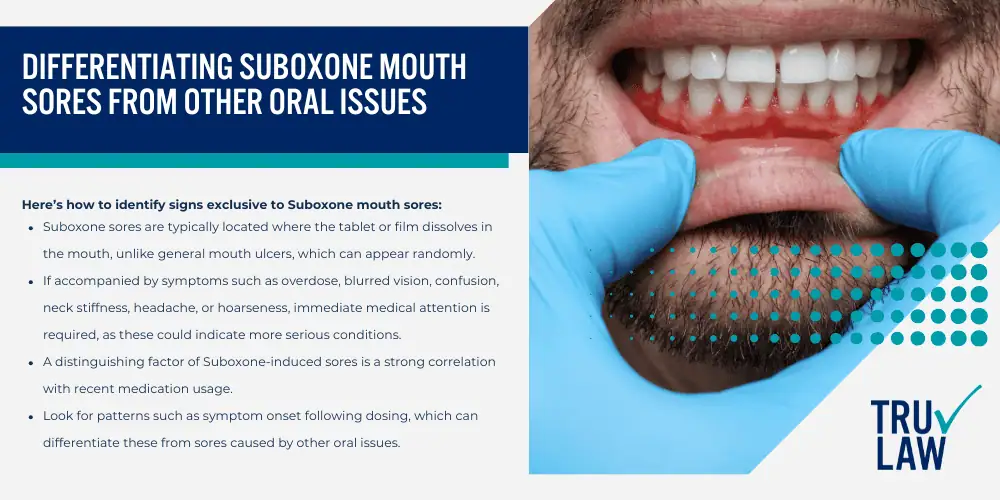
Here’s how to identify signs exclusive to Suboxone mouth sores:
- Suboxone sores are typically located where the tablet or film dissolves in the mouth, unlike general mouth ulcers, which can appear randomly.
- If accompanied by symptoms such as overdose, blurred vision, confusion, neck stiffness, headache, or hoarseness, immediate medical attention is required, as these could indicate more serious conditions.
- A distinguishing factor of Suboxone-induced sores is a strong correlation with recent medication usage.
- Look for patterns such as symptom onset following dosing, which can differentiate these from sores caused by other oral issues.
Diagnosing Suboxone Mouth Sores
Before a definitive diagnosis can be made for Suboxone mouth sores, a healthcare professional often begins with a comprehensive dental examination and may require additional tests to assess the presence and extent of oral damage.
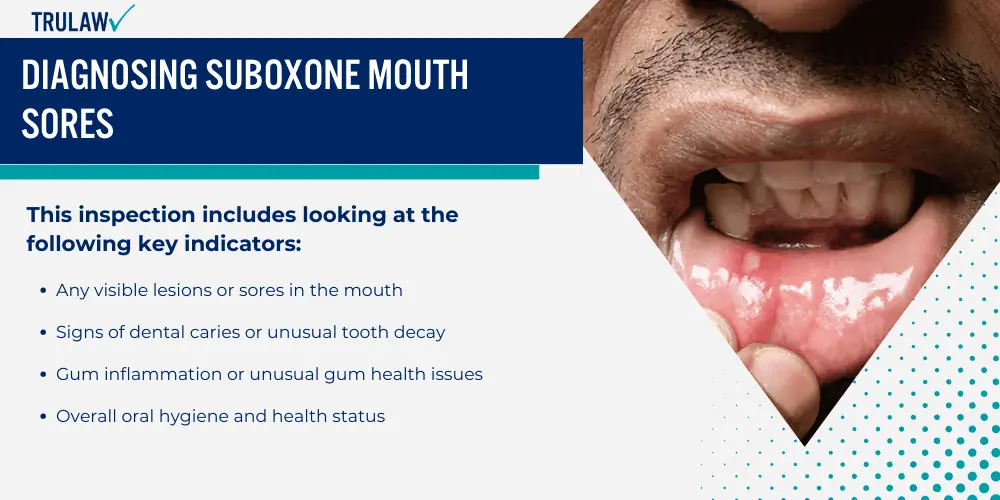
It’s important to consult with a health care professional if you experience any unusual symptoms.
Dental Examination for Suboxone Mouth Sores
During a dental examination, a dentist will typically inspect the oral cavity for signs of sores related to the use of Suboxone.
This inspection includes looking at the following key indicators:
- Any visible lesions or sores in the mouth
- Signs of dental caries or unusual tooth decay
- Gum inflammation or unusual gum health issues
- Overall oral hygiene and health status
The dentist will also review potential medication effects and their impact on oral health, especially the specific presentation of mouth sores associated with dissolving Suboxone in the oral cavity.
Additional Tests for Assessing Suboxone Mouth Sores
If the initial examination suggests Suboxone-induced mouth sores, further tests might be necessary.
These can include:
- Swab tests to rule out or confirm negative infectious causes
- Biopsies of any suspicious or uncertain lesions
- Salivary flow tests to investigate any correlation between dry mouth and sore development
- Blood tests, if systemic issues are suspected to contribute to oral health problems
Treatment Options for Suboxone Mouth Sores
When managing mouth sores caused by Suboxone, patients have several treatment options.
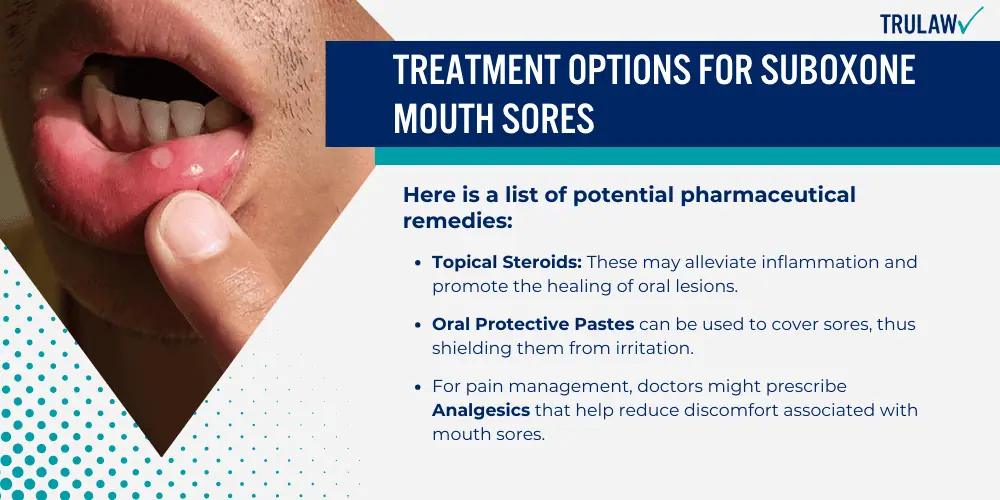
These can range from medications designed to fortify the oral environment to dental interventions aimed at mitigating the adverse effects.
Topical or systemic steroids may be prescribed to help reduce inflammation and promote healing.
Medications for Managing Suboxone Mouth Sores
Medication-assisted treatments play a pivotal role in addressing Suboxone-induced mouth sores.
Here is a list of potential pharmaceutical remedies:
- Topical Steroids: These may alleviate inflammation and promote healing of oral lesions.
- Oral Protective Pastes can be used to cover sores, thus shielding them from irritation.
- For pain management, doctors might prescribe Analgesics that help reduce discomfort associated with mouth sores.
- In severe sores, Systemic Steroids might be considered to suppress inflammatory responses throughout the body.
Dental Procedures for Treating Suboxone Mouth Sores
Dental interventions might be necessary, especially if mouth sores persist or worsen.
Below are some procedures a dentist might recommend:
- Regular dental check-ups are crucial to assess oral health and prevent further decay or damage.
- Professional cleaning may be advised to maintain oral hygiene and remove any irritants.
- If decay is present, restorative treatments such as fillings or crowns may be used to protect teeth and reduce the risk of infection.
- In severe cases, oral surgery might be necessary to remove any damaged tissue and initiate the healing process.
Preventing Suboxone Mouth Sores
Suboxone, a medication used for opioid dependence, can sometimes cause mouth sores.
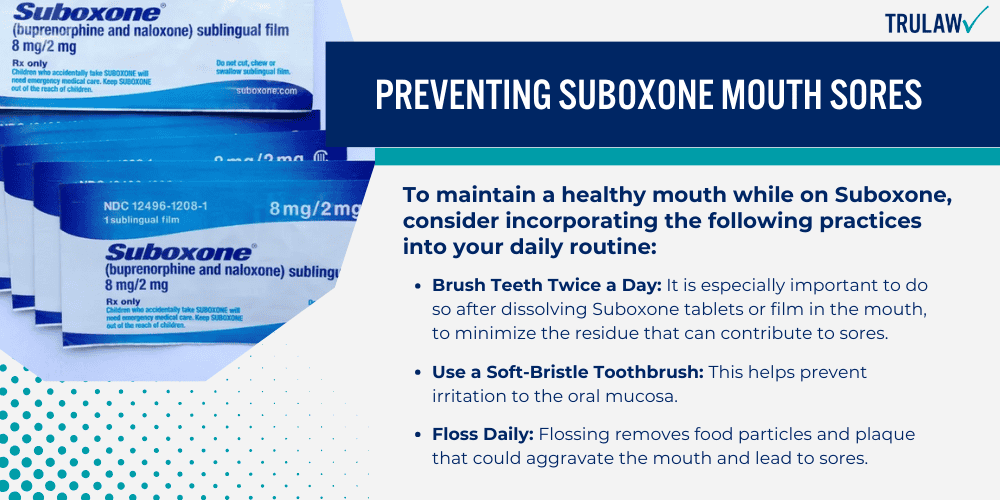
Understanding how to maintain oral health and make appropriate lifestyle adjustments can help reduce the likelihood of these sores developing.
Oral Hygiene Practices for Suboxone Users
Regular oral hygiene is key in preventing mouth sores for those taking Suboxone.
To maintain a healthy mouth while on Suboxone, consider incorporating the following practices into your daily routine:
- Brush Teeth Twice a Day: It is especially important to do so after dissolving Suboxone tablets or film in the mouth, to minimize the residue that can contribute to sores.
- Use a Soft-Bristle Toothbrush: This helps prevent irritation to the oral mucosa.
- Floss Daily: Flossing removes food particles and plaque that could aggravate the mouth and lead to sores.
- Rinse with an Alcohol-Free Mouthwash: This can soothe the oral tissues and prevent the harsh effects of alcohol-based products.
Lifestyle Modifications to Reduce Suboxone Mouth Sore Risk
Adopting certain lifestyle changes can also play a role in preventing mouth sores from Suboxone.
To minimize the chance of developing mouth sores while taking Suboxone, consider incorporating the following habits into your daily routine:
- Stay Hydrated: Drinking plenty of water helps maintain saliva production, which naturally cleanses the mouth.
- Avoid Spicy and Acidic Foods: These can irritate the mouth and potentially worsen any developing sores.
- Monitor Diet: Ensuring a well-balanced diet supports overall health and can strengthen the immune system.
- Seek Regular Dental Check-ups: A dentist can help identify early signs of mouth sores and other oral health issues.
Impact of Suboxone Mouth Sores on Addiction Treatment
Suboxone, a medication used in opioid addiction treatment, may cause mouth sores as a side effect.
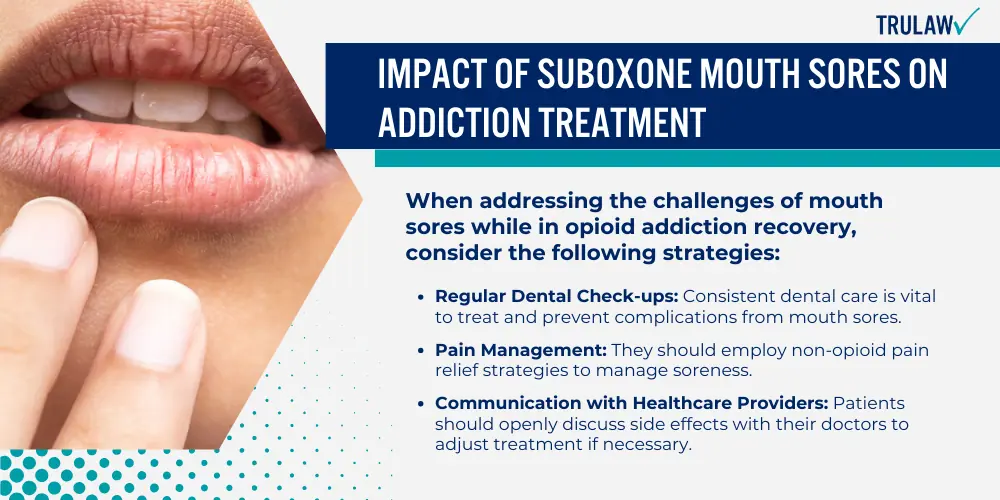
These sores can present challenges in managing overall health while also recovering from addiction.
Balancing Mouth Sore Treatment with Opioid Addiction Recovery
Patients must handle the pain and discomfort of mouth sores without compromising their recovery progress.
When addressing the challenges of mouth sores while in opioid addiction recovery, consider the following strategies:
- Regular Dental Check-ups: Consistent dental care is vital to treat and prevent complications from mouth sores.
- Pain Management: They should employ non-opioid pain relief strategies to manage soreness.
- Communication with Healthcare Providers: Patients should openly discuss side effects with their doctors to adjust treatment if necessary.
- Nutritional Support: A balanced diet can help in healing and maintaining oral health.
Importance of Continuing Suboxone Despite Mouth Sores
The benefits of Suboxone in addiction treatment may outweigh the discomfort of mouth sores.
When considering the importance of continuing Suboxone despite mouth sores, it’s essential to keep in mind the following key points:
- Relapse Prevention: Suboxone is a key medication in preventing opioid relapse.
- Medication Adherence: It’s important to maintain the prescribed medication regimen, even when experiencing oral discomfort, to ensure the success of addiction treatment.
- Support Systems: Patients should engage with support groups to share experiences and solutions for dealing with side effects.
- Collaborative Care: Working closely with their healthcare team helps patients manage side effects while continuing their path to recovery.
Coping with Suboxone Mouth Sores
Managing mouth sores from Suboxone can be challenging but manageable with the right strategies for pain relief and emotional support.
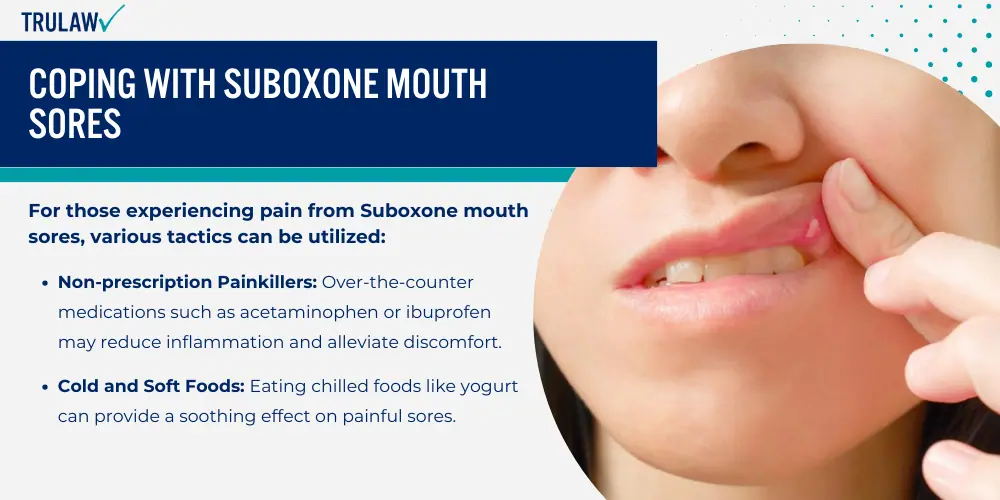
Pain Management Strategies for Suboxone Mouth Sores
Suboxone, a medication used to treat opioid addiction, can sometimes cause mouth sores as a side effect, leading to discomfort and pain.
To manage this, patients can adopt several practical strategies that provide relief and promote healing.
For those experiencing pain from Suboxone mouth sores, various tactics can be utilized:
- Non-prescription Painkillers: Over-the-counter medications such as acetaminophen or ibuprofen may reduce inflammation and alleviate discomfort.
- Cold and Soft Foods: Eating chilled foods like yogurt can provide a soothing effect on painful sores.
- Oral Anesthetics: Gels or sprays designed for oral use can offer temporary relief by numbing the affected area.
- Saltwater Rinse: Rinsing the mouth with a saltwater solution can aid in healing and reduce the risk of infection.
It’s important for individuals to consult their healthcare provider before introducing new pain management options.
Emotional Support for Suboxone Users with Mouth Sores
Emotional support is crucial for individuals dealing with the effects of Suboxone mouth sores.
It can provide a sense of community and shared experiences and help address the emotional challenges of managing mouth sores.
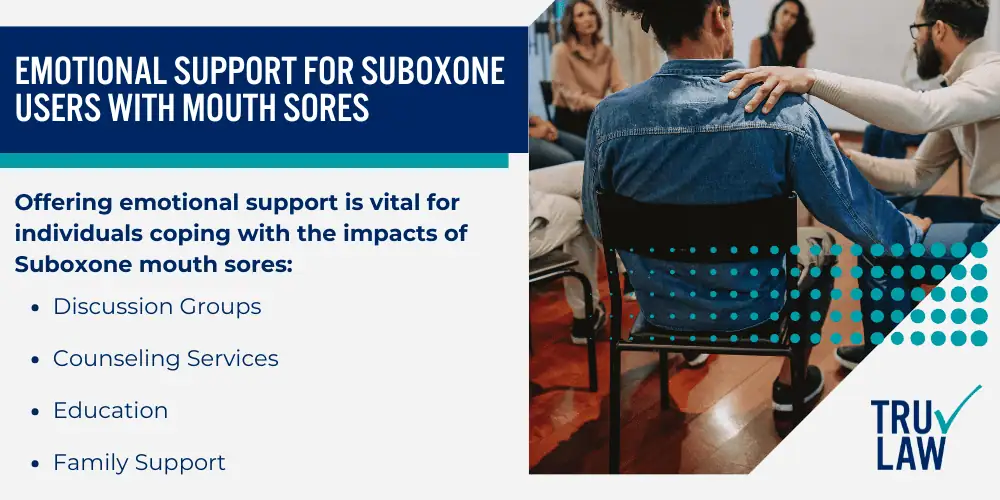
Offering emotional support is vital for individuals coping with the impacts of Suboxone mouth sores:
- Discussion Groups: Joining support groups can provide a sense of community and shared experiences.
- Counseling Services: Engaging with a therapist can help address the emotional challenges of managing mouth sores.
- Education: Understanding the side effects of Suboxone can help individuals better manage their expectations and treatment adherence.
- Family Support: Having the understanding and support from the family can offer comfort and reduce stress related to the condition.
Suboxone Lawsuit Frequently Asked Questions
-
What oral side effects are commonly associated with Suboxone use?
Suboxone, particularly when dissolved in the mouth, can lead to dental issues.
Patients might experience tooth decay, gum disease, or mouth sores as a result of its use.
Some patients may also experience a stuffy nose or sneezing.
-
Is dry mouth a recognized complication when taking Buprenorphine?
Yes, dry mouth is acknowledged as a side effect of Buprenorphine treatment.
A reduction in saliva flow can increase the risk for dental caries and gum disease.
Patients may also experience difficult urination or sweating.
-
Can using Suboxone lead to the development of canker sores?
Suboxone can cause canker sores or mouth ulcers in some individuals.
The exact mechanism isn’t clear, but these painful sores can develop in the mouth during treatment.
-
Are there reports of oral thrush as a consequence of Suboxone treatment?
Patients on Suboxone have occasionally developed oral thrush, characterized by creamy white lesions on the tongue or inner cheeks.
This may be accompanied by unusual weight gain.
-
What do the warnings from the FDA say about Buprenorphine's effects on oral health?
The FDA has issued warnings that Buprenorphine medications for opioid dependence dissolved in the mouth may be linked to dental problems.
These issues can range from cavities and tooth loss to more serious dental infections.
-
What symptoms indicate an allergic reaction to sublingual suboxone in the context of oral health?
Symptoms of an allergic reaction to Suboxone that affects oral health may include swelling of the mouth or throat, hives, and itching.
In severe cases, difficulty breathing may occur, requiring immediate medical attention. Patients may also experience trouble breathing, dizziness, or mental depression.

Managing Attorney & Owner
With over 25 years of legal experience, Jessica Paluch-Hoerman is an Illinois lawyer, a CPA, and a mother of three. She spent the first decade of her career working as an international tax attorney at Deloitte.
In 2009, Jessie co-founded her own law firm with her husband – which has scaled to over 30 employees since its conception.
In 2016, Jessie founded TruLaw, which allows her to collaborate with attorneys and legal experts across the United States on a daily basis. This hypervaluable network of experts is what enables her to share the most reliable, accurate, and up-to-date legal information with our readers!
Additional Suboxone Lawsuit resources on our website:
Here, at TruLaw, we’re committed to helping victims get the justice they deserve.
Alongside our partner law firms, we have successfully collected over $3 Billion in verdicts and settlements on behalf of injured individuals.
Would you like our help?
At TruLaw, we fiercely combat corporations that endanger individuals’ well-being. If you’ve suffered injuries and believe these well-funded entities should be held accountable, we’re here for you.
With TruLaw, you gain access to successful and seasoned lawyers who maximize your chances of success. Our lawyers invest in you—they do not receive a dime until your lawsuit reaches a successful resolution!
AFFF Lawsuit claims are being filed against manufacturers of aqueous film-forming foam (AFFF), commonly used in firefighting.
Claims allege that companies such as 3M, DuPont, and Tyco Fire Products failed to adequately warn users about the potential dangers of AFFF exposure — including increased risks of various cancers and diseases.
Depo Provera Lawsuit claims are being filed by individuals who allege they developed meningioma (a type of brain tumor) after receiving Depo-Provera birth control injections.
A 2024 study found that women using Depo-Provera for at least 1 year are five times more likely to develop meningioma brain tumors compared to those not using the drug.
Suboxone Tooth Decay Lawsuit claims are being filed against Indivior, the manufacturer of Suboxone, a medication used to treat opioid addiction.
Claims allege that Indivior failed to adequately warn users about the potential dangers of severe tooth decay and dental injuries associated with Suboxone’s sublingual film version.
Social Media Harm Lawsuits are being filed against social media companies for allegedly causing mental health issues in children and teens.
Claims allege that companies like Meta, Google, ByteDance, and Snap designed addictive platforms that led to anxiety, depression, and other mental health issues without adequately warning users or parents.
Transvaginal Mesh Lawsuits are being filed against manufacturers of transvaginal mesh products used to treat pelvic organ prolapse (POP) and stress urinary incontinence (SUI).
Claims allege that companies like Ethicon, C.R. Bard, and Boston Scientific failed to adequately warn about potential dangers — including erosion, pain, and infection.
Bair Hugger Warming Blanket Lawsuits involve claims against 3M — alleging their surgical warming blankets caused severe infections and complications (particularly in hip and knee replacement surgeries).
Plaintiffs claim 3M failed to warn about potential risks — despite knowing about increased risk of deep joint infections since 2011.
Baby Formula NEC Lawsuit claims are being filed against manufacturers of cow’s milk-based baby formula products.
Claims allege that companies like Abbott Laboratories (Similac) and Mead Johnson & Company (Enfamil) failed to warn about the increased risk of necrotizing enterocolitis (NEC) in premature infants.
Here, at TruLaw, we’re committed to helping victims get the justice they deserve.
Alongside our partner law firms, we have successfully collected over $3 Billion in verdicts and settlements on behalf of injured individuals.
Would you like our help?
